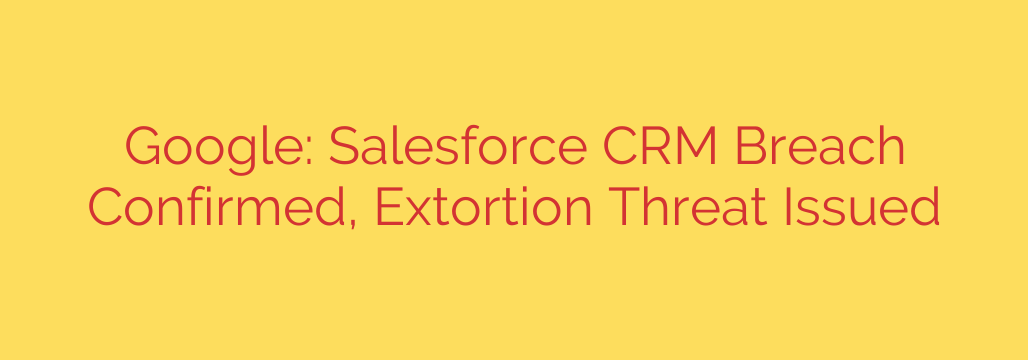
Google Cloud Customer Data Exposed in Salesforce CRM Breach
Google has confirmed a significant data breach impacting a portion of its cloud division’s customer base. The incident originated from a compromised third-party system connected to Salesforce, a widely used Customer Relationship Management (CRM) platform. Cybercriminals who claim responsibility for the attack are now attempting to sell the stolen data online and have issued an extortion threat.
This event underscores the complex security challenges businesses face, even when working with technology giants. Here’s a breakdown of what happened and what it means for your business.
The Details of the Breach: What We Know
According to official statements, the security incident was not a direct breach of Google’s core infrastructure or Salesforce’s primary platform. Instead, threat actors gained unauthorized access to a separate portal managed by a third-party vendor for Google Cloud.
Key points about the incident include:
- The breach occurred in a third-party system used by Google Cloud for sales and customer management processes.
- The compromised system contained a database of customer and prospect information.
- A threat actor successfully exfiltrated this data and has since made it public that they are attempting to sell it on the dark web.
- The attackers have also reportedly issued an extortion demand, threatening further action if their demands are not met.
Google is actively investigating the breach and has begun notifying all affected customers. The company is working to understand the full scope of the incident and assist those whose information was exposed.
What Information Was Compromised?
The primary concern for any business affected by a data breach is the nature of the stolen information. In this case, the exposed data is primarily contact and business-related information used for sales and account management.
The compromised data includes:
- Full Names
- Business Titles
- Corporate Email Addresses
- Corporate Phone Numbers
- Company Names and Addresses
It is critical to note that Google has stated that more sensitive information was not part of this breach. No payment information, financial data, passwords, or confidential customer content stored within Google Cloud services were exposed. The breach was limited to the data held within the specific third-party CRM environment.
Why This Matters: The Threat of Third-Party Risk
This incident serves as a stark reminder of the security vulnerabilities associated with third-party vendors and supply chain partners. Many organizations rely on a complex network of external tools and services to run their operations. While these tools provide immense value, each one represents a potential entry point for attackers if not properly secured.
The root cause was not a flaw in Google or Salesforce’s core security but in a connected, third-party system. This highlights the critical need for businesses to conduct thorough security assessments of all vendors who handle their data, no matter how peripheral they may seem.
Actionable Security Tips for Your Business
While Google is managing this specific incident, the stolen data can still be used to target affected individuals and companies. All businesses should use this event as an opportunity to review their own security posture.
Be Vigilant Against Sophisticated Phishing Attacks: The stolen data—names, titles, and contact information—is a goldmine for cybercriminals crafting highly targeted spear-phishing emails. Train your employees to be suspicious of unsolicited emails, especially those that create a sense of urgency or ask for credentials, even if they appear to come from a known contact.
Audit Your Third-Party Vendor Access: Take inventory of all third-party services connected to your network and data. Regularly review the security practices of your vendors and ensure they meet your standards. Limit data access to only what is absolutely necessary for their function.
Enforce Multi-Factor Authentication (MFA): MFA is one of the most effective defenses against unauthorized access. Ensure that MFA is enabled on all critical systems, including your CRM, email, and cloud services. This provides a crucial layer of security even if login credentials are stolen.
Monitor for Suspicious Account Activity: Keep a close watch on logs and alerts for unusual login attempts or data access patterns within your own systems. Early detection is key to mitigating the potential damage of a breach.
Ultimately, this data breach illustrates that in today’s interconnected digital ecosystem, your security is only as strong as your weakest link. Maintaining a proactive and vigilant security strategy that extends to all partners and vendors is no longer optional—it’s essential for survival.
Source: https://securityaffairs.com/181017/data-breach/google-confirms-salesforce-crm-breach-faces-extortion-threat.html








